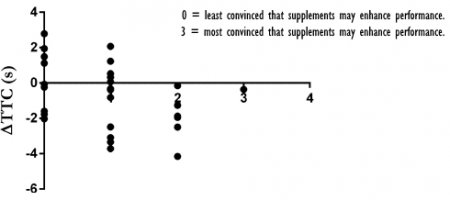Supplementation with placebos is often effective, but is counterproductive for some athletes
If trained cyclists take capsules without active substances, and know that, they perform better. They will cycle faster, Brazilian researchers report in PLoS One. As a group, at least. Placebo supplementation does not work for everyone. For some athletes, placebos even have the opposite effect...
Study
The researchers, who were affiliated with the University of Sao Paulo, had 28 trained female cyclists aged 18-45 on 2 different occasions ride a 1 kilometer time trial. One time the women got nothing at all before they started, on another occasion they received a placebo. The Brazilians gave the women 2 red-white capsules of the type that you see above.
The women knew they were receiving a placebo.
Results
A placebo supplementation made cyclists about a second faster. They completed the time trial 0.7 percent faster.
Mechanism
The researchers were unable to discover how a placebo can improve performance. They looked at the heartbeat, the concentration of lactic acid in the blood and the feeling of tiredness of their test subjects, but could not detect any effect of the placebo.
Conclusion
"An open-placebo intervention may be an effective tool by which to improve exercise performance since administration or an open-placebo protocol improved 1-km cycling time-trial performance in trained female cyclists," the Brazilians summarize.
"There was individual variation in the response and some athletes even experience decreased performance. Participant expectancy appears to play some role in the likelihood of gaining or losing a performance effect, but this factor does not entirely explain all changes in performance."
"Although open placebo may be a novel, ethically acceptable ergogenic aid, some athletes may not respond or even perform worse [...]. Thus, open-placebo interventions should be carefully considered by coaches and practitioners, while further studies are warranted to determine underlying physiological and behavioral mechanisms for any changes in performance."
Source: PLoS One. 2019 Sep 24;14(9):e0222982.
If trained cyclists take capsules without active substances, and know that, they perform better. They will cycle faster, Brazilian researchers report in PLoS One. As a group, at least. Placebo supplementation does not work for everyone. For some athletes, placebos even have the opposite effect...
Study
The researchers, who were affiliated with the University of Sao Paulo, had 28 trained female cyclists aged 18-45 on 2 different occasions ride a 1 kilometer time trial. One time the women got nothing at all before they started, on another occasion they received a placebo. The Brazilians gave the women 2 red-white capsules of the type that you see above.
The women knew they were receiving a placebo.
Results
A placebo supplementation made cyclists about a second faster. They completed the time trial 0.7 percent faster.
Mechanism
The researchers were unable to discover how a placebo can improve performance. They looked at the heartbeat, the concentration of lactic acid in the blood and the feeling of tiredness of their test subjects, but could not detect any effect of the placebo.
Conclusion
"An open-placebo intervention may be an effective tool by which to improve exercise performance since administration or an open-placebo protocol improved 1-km cycling time-trial performance in trained female cyclists," the Brazilians summarize.
"There was individual variation in the response and some athletes even experience decreased performance. Participant expectancy appears to play some role in the likelihood of gaining or losing a performance effect, but this factor does not entirely explain all changes in performance."
"Although open placebo may be a novel, ethically acceptable ergogenic aid, some athletes may not respond or even perform worse [...]. Thus, open-placebo interventions should be carefully considered by coaches and practitioners, while further studies are warranted to determine underlying physiological and behavioral mechanisms for any changes in performance."
Source: PLoS One. 2019 Sep 24;14(9):e0222982.



